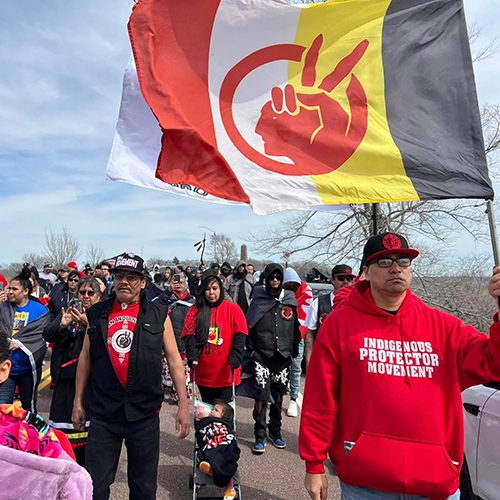Safe Communities
Grant Supports New Conviction Review Unit

Minnesota’s newly established Conviction Review Unit (CRU) is ramping up its efforts to free people who are in prison for crimes they didn’t commit—and to prevent wrongful convictions from happening in the first place.
“This is a very important project to restore confidence in our criminal justice system,” said Minnesota Attorney General Keith Ellison, whose office is operating the CRU through a partnership with the Great North Innocence Project. “We know that, overwhelmingly, people who are convicted are guilty of what they were accused of. But even if just 1 percent of folks are innocent, that’s literally hundreds of people.”
Incubated with a federal grant awarded in 2020, the CRU has gotten to work quickly, hiring a director and, this summer, starting to accept applications from defendants who say they are innocent of the crimes for which they are incarcerated. But the initial funding is only enough for a skeletal staff—the director and a quarter of one attorney’s time—and must be spent in just two years.
A $310,000 grant from the Minneapolis Foundation’s Fund for Safe Communities will help build out the program. Established in 2018, the Fund for Safe Communities invests in efforts to prevent violence, heal communities, and address systemic inequities in the criminal legal system. Funding for the CRU complements a variety of investments that the Minneapolis Foundation is making to identify and advance needed policy changes, including a partnership with The Policing Project, which works to ensure front-end accountability and democratic participation in policing policy and practices.
“Minnesota’s new CRU is an important opportunity to make a difference not only in the lives of people who have been wronged by the criminal justice system, but the system itself. We are excited to support this project and look forward to its findings.” — Chanda Smith Baker, Minneapolis Foundation Chief Impact Officer
The two-year grant will enable the CRU to hire a paralegal, pay for services such as forensic testing and translation, and cover some expenses related to program leadership and grants management. Crucially, it will help the CRU work through the very tall stack of applications it has already received—638 by the end of November, said Carrie Sperling, the unit’s director. All those cases will go through an initial screening process to determine whether they meet the program’s minimum requirements. Those that do will be reviewed more closely, with only the strongest cases resulting in full investigations.
Minnesota’s CRU, while only the fourth to operate statewide out of an attorney general’s office, is one of dozens nationwide. “Around the country, the work that CRUs are doing is groundbreaking, because we are partnering with the prosecutors to try to get to the truth” instead of engaging in adversarial post-conviction litigation, said Sara Jones, Executive Director of the Great North Innocence Project.
Last year, 61 percent of all exonerations came about through CRUs, and Sperling said she expects that number to grow. Because so many of these exonerations come from a prosecutor’s office, she said, CRUs have also reduced the time that people spend in prison awaiting exoneration. “They don’t have to wade through years and years of post-conviction litigation in order to resolve the case.”
In addition to creating a pathway for innocent people to be freed, Minnesota’s CRU will work to identify the true perpetrators of crimes. Perhaps most important of all, it will collect data about the most common causes of wrongful conviction, potentially leading to needed reforms. “The information that comes flooding in from these applications is essential in giving you snapshots of the criminal justice system,” Sperling said. “Even before we start delving deeply into investigations, it’s amazing what you can already see in terms of patterns.”

